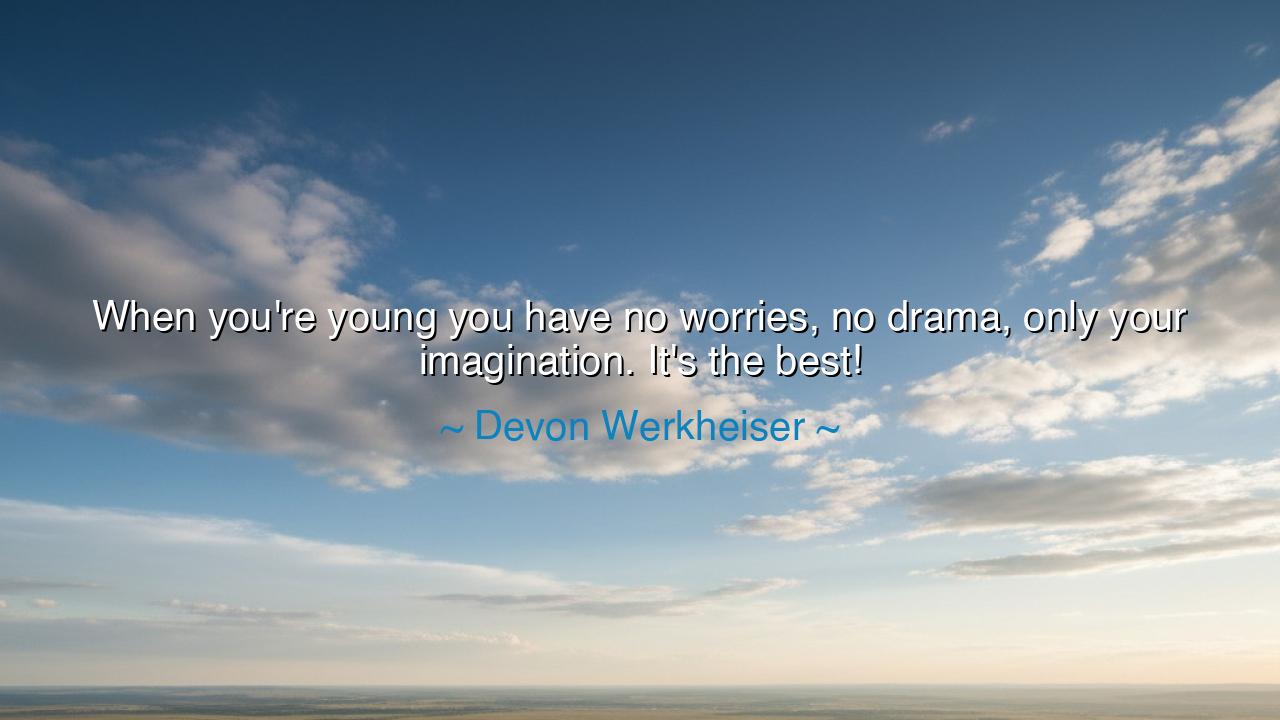
When you're young you have no worries, no drama, only your






"When you're young you have no worries, no drama, only your imagination. It's the best!" These words from Devon Werkheiser capture a simple but profound truth about the nature of youth and imagination. The beauty of childhood, Werkheiser reminds us, lies in its freedom—a freedom unburdened by the weight of responsibilities, fears, or societal pressures. It is a time when the mind, unencumbered by the harsh realities of the world, can roam freely through the landscape of imagination, where anything is possible. In this state, creativity flows uninhibited, and the world is seen with fresh eyes, full of wonder and possibility.
In the ancient world, youth was often regarded as a time of both innocence and potential. The Greeks, in particular, saw the early years of life as a time when the soul was open to the world and to learning. The philosopher Plato famously wrote in his works that children were closest to the divine, as their minds were untainted by the worries of the world. In his Republic, Plato even spoke of the playful nature of children, suggesting that they were best able to imagine and create because they had not yet been conditioned by the rigid expectations of society. Plato’s words, much like Werkheiser’s, reflect the unique power of the young mind, a mind that still dances with imagination and is yet to be weighed down by drama or doubt.
Consider the ancient story of Alexander the Great, who, as a young boy, was taught by the philosopher Aristotle. Despite the vast responsibilities awaiting him as a king and conqueror, Alexander’s early years were steeped in the imaginative tales of gods, heroes, and adventures. He was raised on stories of legendary battles and the power of the gods, and it was this youthful imagination that likely fueled his later conquests. Just as Werkheiser celebrates, Alexander’s early years were shaped by an unconstrained mind, one that saw the world not as it was, but as it could be. The early years of childhood are, after all, the springboard for many of the most inspired actions that follow in life.
The freedom of youth to engage with the world through imagination is not just a poetic ideal, but a deeply important part of human development. The great artists, philosophers, and thinkers of history often looked back on their childhood with a sense of reverence. Leonardo da Vinci, for example, spent his youth exploring the world with an insatiable curiosity and an ability to see beyond the ordinary. His imagination was nourished by a childhood free from the pressures of adulthood, and it was this very freedom that allowed him to dream up designs for flying machines and study the anatomy of the human body with an open mind. Da Vinci’s childhood, much like Werkheiser’s description, was a time of unrestricted creativity—a time when imagination was his greatest tool.
However, as we grow older, the world often demands that we leave behind this innocence and embrace the burdens of life. The Roman philosopher Seneca once wrote that youth, while full of vitality and dreams, is often the most fleeting period of life. The ancients understood that as one ages, responsibilities increase, and with them comes the potential for anxiety and disillusionment. The balance between youthful imagination and the realities of adulthood is a theme found in many of their teachings. Seneca, while acknowledging the fleeting nature of youth, also urged that the wisdom we gain as we age should not strip us of our imagination or the ability to see the world with awe. This idea is a call to maintain the vibrancy of the youthful spirit even as we face the challenges of the world.
What Werkheiser offers us is an important reminder of the value of imagination at any age. While the demands of adulthood may overshadow the free, creative play of youth, we can still nurture that same imaginative energy as we grow older. This is the lesson we can learn from both the ancients and from contemporary reflections like Werkheiser’s: creativity and imagination are not just tools of childhood—they are the very forces that drive innovation, joy, and meaning throughout our lives. The key, however, is to preserve that sense of wonder and possibility that comes so naturally in youth, allowing it to fuel our pursuits even as we grow.
So, let us all take a moment to reflect on the power of imagination in our own lives. Whether we are young or old, the ability to dream, to create, and to see the world through the eyes of a child is a gift that we should cherish and nurture. Like the ancient thinkers and artists, we must honor that creative spark within us, refusing to let the drama of life extinguish the light of possibility. Whether it’s through art, literature, science, or simply the way we interact with the world, we should seek to engage with life in a way that embraces wonder, and reminds us that the greatest power we hold is the ability to imagine what could be.






AAdministratorAdministrator
Welcome, honored guests. Please leave a comment, we will respond soon